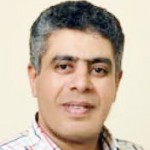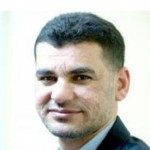Many columnists have discussed the recent attacks on Gaza, which occurred despite President Mohamed Morsy predicting an end to the Israeli aggression on Monday. Other commentators tackled the deteriorating media situation and the ongoing clashes around Mohamed Mahmoud Street.
The best eras of security vacuum
Emad Al-Din Hussein
Al-Shorouk newspaper
Hussein denounces what he describes as a security vacuum in Egypt, recalling a recent conflict between police and army officers at a police station in the neighbourhood of New Cairo. The story started when a police checkpoint stopped an army officer who had been driving without a license. No details were given regarding the initial interaction between the two parties.
The writer thinks that such an incident should further prove to Egyptians that the country is going through uncontrollable chaos. It is known that the relations between police and army have become more difficult, especially after the 25th January revolution, when army officers were more supportive to revolutionaries, who were in turn abused by police.
When street vendors engage in fights, the police intervene and apply the law. Hussein asks what legal action has been taken regarding the recent police-army clash. Egyptians can no longer be placated by meaningless statements assuring them that everything is fine. A conflict between two of the state’s most important institutions demands a thorough investigation. He wonders what kind of reaction will come from the public when further details of the skirmish are announced.
The hijacked constitution
Mohamed Salmawi
Al-Masry Al-Youm newspaper
With the breakup of the Constituent Assembly, Salmawi sees no prospect for the emergence of a nationally agreed-upon constitution. He accuses political Islamists of staunchly pressing for the advancement of their narrow partisan and sectarian interests at the expense of the national interest. Salmawi’s critique compares the way political Islamists caused the non-Islamist third of the assembly to resign to the way an Islamist society regulates its own internal code.
Now with a purely Islamist makeup, Salmawi sees no prospect for a constitution that might be even close to achieving consensus. The reason he cites is that the Constituent Assembly will by default lack the essential pillar of pluralism while writing its draft. An Islamist constitution, which does not enjoy the widespread public support, is the only kind likely to be produced by the current assembly, according to Salmawi.
Salmawi compares the determined attempts of political Islam to dominate the political sphere by marginalising any opposition with the former days of the National Democratic Party and its zero-sum political games against its opposition. He condemns the Islamists for wasting months to reach an end they had always wanted, which was hijacking the constitution, in lieu of making use of this invaluable time to reconstruct the country.
Egypt and Palestine in the Muslim Brotherhood era
Tamer Wagih
Al-Masry Al-Youm newspaper
Scrutinising the reactions to Egypt’s statements on Gaza, Wagih notes that some groups support Morsy’s stance, while others believe that interfering was a strategic and political mistake. Although the latter group believes in the strong connection between the Egyptian and the Palestinian uprising, Wagih believes that there isn’t a logical explanation to the nature of this relation.
On another note, Wagish says the time has come to dissect the relations between the Arab revolutions and resistance movements, especially since the Syrian revolution has proven the extent to which such movements have helped in supporting regimes in Palestine and Lebanon.
Does supporting the resistance mean that we have to accept the Hamas’ backwards aspects or the sectarian angle in Fatah? According to the columnist, the best approach to understanding relations between the Arab uprisings and resistance movements is to comprehend the popular grass-roots nature of both, and the temporary dominance of political movements on revolutions. Wagih believes that the most-needed step at this stage is creating a long-term strategy to support Hamas, while revealing how negligent its leaders are.
Minister of media, choose your opponent
Khalid Montassir
Al-Watan Newspaper
Montassir directs his advice to the minister of media following the closure of Dream satellite TV channel and the plans to stop ONTV broadcasting. While the Muslim Brotherhood-affiliated minister justified the first case by saying the channel was broadcast outside the Media City, the second case was justified by arguing that ONTV is not a news channel.
Montassir considers this entire debate a marginal issue, and calls the minister of media to have a deeper look into the real enemies of the Muslim Brotherhood.
He cites the overall failure of the state led by Muslim Brotherhood in all respects of life; starting with the growing insecurity, the record of sexual harassment, economic decline, and ending with the gross negligence that led to the Assiut school bus crash tragedy. To Montassir, these are the true enemies of the Muslim Brotherhood and not the media.
Nevertheless, Montassir draws upon the lack of creativity in the Brotherhood’s media, which is a natural result of their “listen and obey fascist chain of command.” He finally warns that the unfair treatment of Egyptian-based satellite TV channels is coupled with generous treatment of the Qatari Al-Jazeera Mubashir Misr channel.
What Israel did not expect
Fahmi Howeidi
Al-Shorouk Newspaper

Al-Shorouk Newspaper
Fahmi Howeidi conducts an in-depth analysis of the new factors that have emerged in the current conflict between Israel and Hamas in the Gaza Strip. In 2008, there was virtually no support of any sort to the Palestinians from the Arab and Muslim world when Israel bombarded Gaza.
However, following the Arab Spring, and the emerging regional influence of Turkey, the tide has changed. He recalls how the ex-director of Egyptian intelligence negotiated a humiliating ceasefire deal with Hamas in 2008, which allowed the Israelis to maintain their positions in Gaza.
In contrast, Howeidi lauds the diplomatic efforts exerted by President Morsy and his cabinet to express solidarity with Gaza, and praises the new role played by Saudi, Qatari, and Turkish diplomats to contain the situation. Furthermore, the Israeli Iron Dome missile defence system proved to be ineffective against the locally-manufactured Palestinian rockets, which were able for the first time to reach major Israeli urban centres such as Tel-Aviv and Jerusalem.
Howeidi considers this as good news for the Iranians, who are now aware of the defence system’s shortcomings. It came as no surprise to Howeidi to see the Israelis themselves calling for a ceasefire this time, taking into account the above-discussed factors.
Mohamed Mahmoud in 2011, 2012 and the Muslim Brotherhood
Ibrahim Mansour
Al-Tahrir newspaper
Mansour denounces the state’s reactions to the protests marking the first anniversary of the Mohamed Mahmoud Street clashes. In 2011, when Mohamed Mahmoud protesters were killed and injured, the Muslim Brotherhood regarded them as thugs contributing chaos to Egypt.
The Islamist group was at the time securing secret deals with the then-ruling Supreme Council of Armed Forces before the parliamentary elections were held on 26 November. Thanks to those who died in Mohamed Mahmoud Street, military rule in Egypt ended.
The writer criticises the skirmishes that are continuing for a third day in the same street after the Ministry of Interior earlier issued a statement warning against attacks on police forces. If Mohamed Mahmoud Street protesters were demonstrating against a failed parliament in 2011, those of this year mark a failing Constituent Assembly and constitution.





